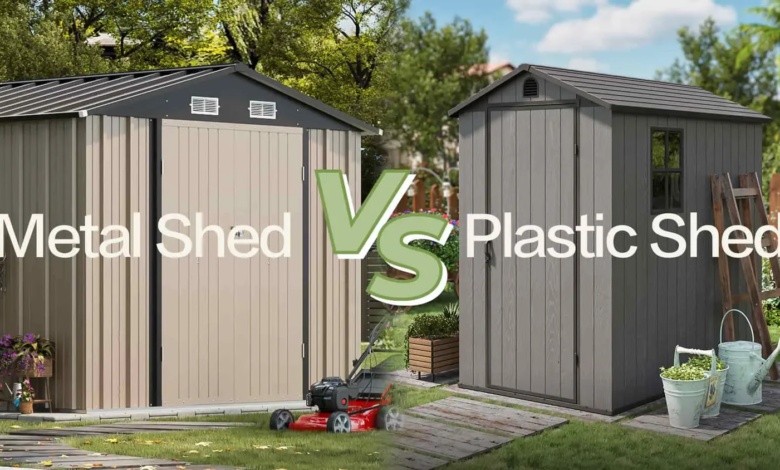Metal vs. Plastic Sheds: Which Is Better?

When it comes to choosing the right shed for your yard, the debate often boils down to metal versus plastic. Whether you need a full-sized shed or a small outdoor storage box the material can significantly impact the shed’s durability, maintenance, and overall appearance. Metal and plastic each offer unique advantages, making the decision challenging yet essential. This guide will compare these two materials to help you select the best option for your outdoor storage needs.
| Feature | Metal Shed | Plastic (Resin) Shed |
| Durability | Highly durable, resistant to dents | Durable, resistant to rot, rust, and pests |
| Weather Resistance | Good; prone to rust if not treated | Excellent; UV and moisture-resistant |
| Maintenance | Low; may need rust protection | Very low; no painting or sealing required |
| Weight | Heavy, sturdy | Lightweight |
| Ease of Assembly | Moderate; may require tools and time | Easy; panels snap together easily |
| Aesthetic Appeal | Industrial look, fewer color options | Modern, available in various colors |
| Insulation | Poor; conducts heat and cold | Moderate; better insulation |
| Cost | More affordable | Moderately priced |
| Lifespan | 10-20 years (with maintenance) | 15-20 years |
| Pest Resistance | 100% pest-proof | Resistant to pests like termites |
| Best For | Tools, equipment, general storage | Low-maintenance backyard storage |
Metal Sheds: Durability and Strength
Metal sheds are highly regarded for their strength and ability to withstand extreme weather conditions. Constructed from materials such as galvanized steel or aluminum, these sheds are perfect for areas with heavy snow, strong winds, or intense heat. A metal shed offers excellent security, making it ideal for storing tools or equipment that require extra protection. However, metal sheds can be prone to rust over time if not properly maintained, and their industrial appearance may not suit every backyard aesthetic.
Plastic Sheds: Lightweight and Maintenance-Free
Plastic sheds have surged in popularity due to their lightweight and weather-resistant nature. Typically made from high-density polyethylene or resin, plastic sheds are impervious to rot, rust, and pests. They are easy to assemble and require little to no maintenance, making them an attractive option for homeowners looking for convenience. Plastic sheds are particularly suitable for smaller storage needs, such as a small outdoor storage box for garden tools or seasonal decorations. Despite these benefits, plastic sheds may lack the sturdiness of metal in areas with high winds or heavy snow loads.
Comparing Weather Resistance
Weather resistance is a crucial factor when choosing a shed material. patiowell storage shed excel in handling severe weather conditions, provided they are treated with rust-resistant coatings. Their sturdy construction ensures longevity even in extreme climates. Plastic sheds, while resistant to moisture and UV rays, may struggle in very high winds or under the weight of heavy snow. If you live in a region with unpredictable weather, considering how each material performs in your local climate will guide your decision.
Maintenance Requirements
Maintenance is often a deciding factor for many homeowners. Metal sheds require occasional upkeep, such as applying rust-proof coatings and tightening loose screws. In contrast, plastic sheds are virtually maintenance-free, requiring only a periodic wash with soap and water. If you prefer a low-maintenance solution for items like a small outdoor storage box, plastic sheds may be the better choice. However, metal sheds are a better long-term investment if you prioritize durability over convenience.
Aesthetic Appeal and Versatility
The visual appeal of a shed plays a significant role in how well it integrates into your yard. Metal sheds have a utilitarian look that suits modern or industrial-style homes. On the other hand, plastic sheds are available in various colors and designs, making them a more versatile option for complementing different outdoor aesthetics. Whether you prefer the sleek lines of a metal shed or the customizable appearance of a plastic one, your choice should align with your personal style and landscaping goals.
Cost Considerations
Cost is a practical aspect that influences many purchasing decisions. Metal sheds are generally more expensive upfront but offer greater longevity and security, which can offset the initial investment. Plastic sheds are more affordable and are a great budget-friendly solution for smaller storage needs, like a small outdoor storage box. By considering both the initial cost and long-term expenses, such as maintenance and repairs, you can determine which material offers the best value for your money.
Conclusion
The choice between metal and plastic sheds ultimately depends on your specific requirements and preferences. Metal sheds provide unmatched strength and durability, making them ideal for long-term storage in challenging climates. Plastic sheds, with their lightweight, weather-resistant design, are perfect for smaller, low-maintenance storage needs like a small outdoor storage box. By evaluating factors such as weather resistance, maintenance, cost, and aesthetic preferences, you can confidently select the shed material that best suits your outdoor space and storage requirements.



